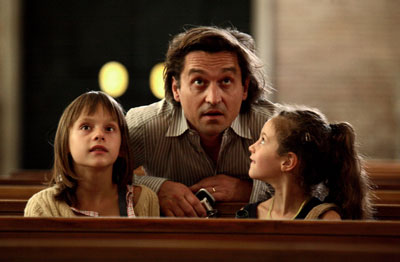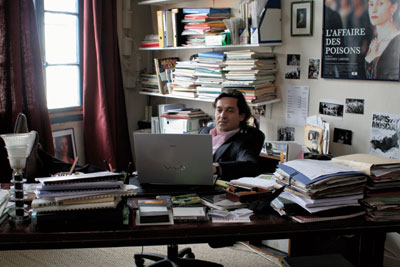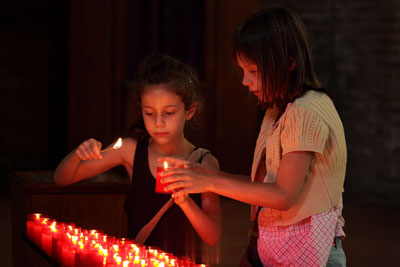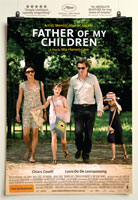Mia Hansen-Love Father Of My Children Interview

Mia Hansen-Love Father Of My Children Interview
Where did the inspiration for the film come from?Mia Hansen-Love: The film stems from my encounters with Humbert Balsan. I first met him in early 2004. He died in February 2005. He wanted to produce my first film, All is forgiven. His enthusiasm and trust were decisive for me. I didn't write this movie out of gratitude, however, but because of Humbert's personality. He had an exceptional warmth, elegance and aura. His energy, passion for films and sensitivity, which I took to be an invincible inner beauty, are what made me write the movie. Of course, there is also his suicide. The feelings of failure and despair that it reveals are overwhelming, but that doesn't replace the rest. It doesn't become the only truth. I wanted the film to express the paradox of contradictory movements within the same person, the conflict that can occur between light and darkness, strength and vulnerability, the desire to live and the urge to die.
We get the feeling you knew him very well, or well enough to understand what drove him, while depicting him as a fairly secretive character.
Mia Hansen-Love: In one year I must have met him about fifteen times at the most, so I hardly 'knew' him. I didn't try to find out more. The aim wasn't to make a biopic. I let my feelings and intuitions guide me, without trying to verify that they conformed to reality. I tried to be as exact and truthful as possible in my portrayal of independent cinema in France, but I did no research into Humbert Balsan's private life, of which I knew nothing. I wanted my distance and complete ignorance of it to enable me to feel free, to write a work of fiction. Moreover, I wanted Grégoire Canvel's death to remain a mystery to some extent. The enigma interested me more than elucidating it. Of course, there is a context that is far from banal: bankruptcy. The context is crucial, but takes nothing away from the mystery of a human being who is capable of such an act, of such self-destructive violence. Thus, more than an essential clue, the story of Grégoire Canvel's love child is a metaphor for secrecy and, moreover, of the idea that secrets are nothing compared to what is deep down, which remains elusive. A last word on the inspiration for the film: Humbert may be the source, but I wouldn't have written it if I hadn't seen his wife, Donna Balsan, in his company offices the day after Humbert's death. Her calmness and stoicism were astonishing. Donna wasn't Humbert, but it was as if part of that charisma lived on. When I wrote the script, I had only seen Donna a couple of times-she was a stranger, but it was her luminous presence that made me want to make the movie.
 At the same time, you have made a film about the cinema or the world of cinema. You emphasise the collective and very tangible aspects of the process, the preparation of a shoot, financial difficulties, with the focus on a pivotal character, the producer.
At the same time, you have made a film about the cinema or the world of cinema. You emphasise the collective and very tangible aspects of the process, the preparation of a shoot, financial difficulties, with the focus on a pivotal character, the producer. Mia Hansen-Love: A few years ago, no theme would have struck me as less stimulating for a movie than independent cinema. Probably by being too close to home, too mundane... But that encounter with Humbert Balsan and his death changed all that and gave me a completely different perspective on the cinema. And it occurred to me that a film about a producer could be a film about work, commitment, love and life. Most often, when I see a producer on screen, I don't see the cinema as I understand it and experience it as part of my daily life. It's more a far-removed fantasy. So, it was even more gratifying to depict the cinema through my perspective and experience because it offered an empty canvas and fascinating raw material for human relationships. Money is such an important issue in the movie, I think, because it's the reality. Whichever way you look at it, the producer's job is synonymous with financial concerns. Filmmakers share this preoccupation but not in the same way, nor to the same extent, because the dangers to which it exposes them are different. A filmmaker has a relatively fundamental and healthy relationship to money: being constantly confronted with financial realities is the price to pay for practising your art. For a producer, chasing after funding can become alienating and lead to a dilemma (I'm referring here to producers who aim to produce the work of artists). On the one hand, there's a noble, ambitious vision to their trade; and on the other, huge loneliness, and economic and moral suffocation due to the constant pressure that comes from taking risks in a context that is relatively unfavorable economically and culturally.
Your film shows a man of charisma at his peak. The character has an aura, lots of charm. But difficulties add up and you show him subsiding, being crushed.
Mia Hansen-Love: I'd say that his doubts and despondency are there at the start, under the surface and occasionally visible in Louis-Do de Lencquesaing's expressions and silences. But generally they're soaked up in the pleasure he gets from his job and the company of his wife and daughters.
Even so, anxiety and lassitude creep forward until, just before his suicide, Grégoire Canvel is overwhelmed by despair, which is even more powerful because it has been powerfully repressed. The film tries to show how this life force-hisextraordinary capacity to repress things-eventually becomes a terribly self-destructive force. One imagines that the character of the young man who gives Grégoire his script is you, to some extent?
Mia Hansen-Love: Of course, I'm present in the character of Arthur, but this young filmmaker could just as easily be someone else. Above all, it shows the vital need Grégoire Canvel feels to keep moving forward and keep taking risks despite his terrible difficulties. It's reaching out to youth and to the future. But the encounter with Arthur is brief, leaving a sense of unfinished business that, for me, resonates with All Is Forgiven, in which the heroine loses her father just after being reunited with him. In both cases, there's the sense of something being passed on, the hope that a secret bond will survive his demise. The young future director is also there to express the birth of a vocation. It's never quite so explicit but I think the idea is present in the film. The beauty of being a producer, as Grégoire Canvel considers his profession, lies in the acuity of his intuition and understanding of the vocation and vision of the filmmakers he wants to support. Similarly, being seen, understood and sought after by a producer can give a young filmmaker a formidable boost. I wanted to evoke this quasiamorous relationship and demonstrate its effect, which is why Arthur, the character, continues to exist and even grows in importance after the producer's death.
 How did you choose Louis-Do de Lencquesaing to play the lead?
How did you choose Louis-Do de Lencquesaing to play the lead? Mia Hansen-Love: I only began to think about who would play the part after the script was finished. I couldn't imagine it being someone very well known because that would go against the story. There's an incognito aspect to the character-he's in the wings, not the spotlight-that I couldn't betray. Very soon, Louis-Do de Lencquesaing, whom I'd seen in several films and plays, became the obvious choice. He's an excellent actor but, above all, I don't see anybody else with his aristocratic bearing, which was essential for the role. We'd already met and I knew he'd have the charisma to play Grégoire Canvel. Moreover, I sensed that by looking for it I'd find what goes hand in hand with that charisma-suffering, concealed but deep-rooted suffering. He immediately understood where I wanted to take him and in table-reads, he hit the right tone very quickly. But discussions and prep work don't build the essence of the character-that comes on the shoot, at the moment of shooting. In this case, in Grégoire's hyperactivity. You act differently if you're seated than if you have to close a door, open a window, check emails, send texts, initial a contract or sign a check while delivering your lines.
The role of his wife is very important, in the background at first, then crucial. You gave the part to an Italian actress, Chiara Caselli. What can you tell us about her and her character?
Mia Hansen-Love: It took me some time to find Chiara. I didn't want Sylvia to be French and thus to be from the same world as Grégoire Canvel. Firstly, it fits Grégoire to be married to a foreigner-it feels logical. And secondly, it's a consideration that emphasises her courage and fragility after Grégoire's death. Her commitment to Moon Films until the company is liquidated is given particular value by the fact that you sense she won't take root and, at the end of the film, she talks about going back to Italy. However, she serves a cause that isn't hers despite already knowing how it will most likely end. Perhaps she thinks she doesn't have any choice, but in fact, for her, it's about seeing something through to the end. It's also about actively staying with Grégoire-a way of achieving closure, most probably.
After I spent a long time looking, Chiara's face appeared and appealed to me. She radiated a peculiar beauty, character and a certain intransigence. After that, I saw some of her films and met her in Rome several times. My impression was always the same: solidity, calm and intelligence. That's how I pictured Sylvia. There is also, in Chiara, a flicker of discreet melancholy that seems to escape her, although her character says the opposite. I liked that. It was lucky that Chiara speaks excellent French, because that was vital even though it's not what led me to her. On the shoot, Chiara devoted herself to her character and showed blind trust in me, for which I'm very grateful.
The children play a very important role in the film. They must each find a way to overcome their loss. For the oldest child, Clémence (Alice de Lencquesaing), that means entering her father's world...
Mia Hansen-Love: Coming off All is forgiven, I couldn't imagine not working with children again. I wanted to keep that momentum going, take it further. On set, the children's presence and subsequent disorder, their happiness and fragility are extremely precious. They're an amazing breath of fresh air in what can be a stifling atmosphere. Their role in the film is close to what they represent for me! Each child grieves differently, and these differences became clearer on set depending on their age and personality. At the end of the movie, Clémence becomes more prominent, almost the lead character. It reflects the emancipation that is taking shape. Emancipation but also the assumption of a spiritual legacy, as suggested by the bond that develops with Arthur, the young filmmaker. In that respect, this film mirrors my first feature.
Like in All is forgiven, a prevailing feeling in your second film is one of characters discovering clarity. People and things can take on a distinct light, sometimes almost in spiritual terms.
Mia Hansen-Love: Well yes, clarity is something I consciously set outto achieve. The word became essential for me when I started writing about films. I seem to remember reading a text by Eric Rohmer in which he quotes Stendhal as referring to the "slightly abrupt clarity" that might define French art. I look for clarity because it's what moves me, what gives me the sense of what's vital to something when I'm assessing it, the infinite part of each being and each thing, without style getting in the way. Although I don't believe in God, for me, the cinema can't be anything other than a quest for light, which is a quest for the invisible.
Interview by Serge Toubiana.

Father Of My Children
Cast: Chiara Caselli, Louis-Do de Lencquesaing, Alice de Lencquesaing, Alice Gautier, Manelle Driss, Eric Elmosnino, Sandrine Dumas, Dominique Frot, Djamshed Usmonov, Igor Hansen-Love, Magne Havard Brekke, Eric Plouvier, Mickael Abiteboul, Philippe Paimbalnc, Andre MarconDirector: Mia Hansen-Love
Genre: Drama
Running Time: 109 minutes
Synopsis: Grégoire Canvel (Louis-Do de Lencquesaing) has it all - a wife and three delightful daughters he adores and a stimulating job that he's devoted to. He's a film producer. Discovering new talent and developing projects that fit his conception of the cinema - free and true to life - is what drives and fulfills him.
Grégoire devotes almost all his time and energy to his work. On the surface he seems invincible, maintaining humour and charm as he juggles the never-ending demands of his company with his domestic responsibilities. But passion can also lead to obstinacy, and when Grégoire's reserves - financial and emotional - reach a tipping point, his wife Sylvia (Chiara Caselli) and children share in the repercussions.
Release Date: August 26th, 2010
Website: www.fatherofmychildren.com.au
MORE
- Mission: Impossible Fallout
- Glenn Close The Wife
- Allison Chhorn Stanley's Mouth Interview
- Benicio Del Toro Sicario: Day of the Soldado
- Dame Judi Dench Tea With The Dames
- Sandra Bullock Ocean's 8
- Chris Pratt Jurassic World: Fallen Kingdom
- Claudia Sangiorgi Dalimore and Michelle Grace...
- Rachel McAdams Disobedience Interview
- Sebastián Lelio and Alessandro Nivola...
- Perri Cummings Trench Interview



